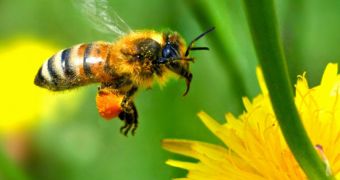Earlier this year, in April, the European Union passed a law saying that three pesticides documented to harm bees were to be banned for a period of two years. Recent news on the topic says that the ban came into effect yesterday, December 1.
Thus, farmers in EU member states are no longer allowed to use imidacloprid, clothianidin and thiamethoxam to spray their crops.
In a blogpost, Claire Kremen with the University of California, Berkeley details that these three pesticides are all neonicotinoids, meaning that they are neuroactive insecticides similar to nicotine.
Several studies have shown that they affect not just honeybees, but also other pollinators. This means that, although they might help keep crops safe from various pests, they still have a negative effect on agricultural practices.
As reported back in April, the EU expects that this two-year ban on the use of said three pesticides will allow wild pollinator populations, and especially bee colonies, in the member states to recover, and that this will eventually translate into better agricultural yields.
However, many environmentalists think that outlawing the use of these chemical compounds for two years is not enough, and that the ban should be extended.
“This is a good start, but this ban will not be robust enough. In reality, a two year suspension is not enough to see our bee populations recover. Neonicotinoids have a half-life (the time taken for half of the chemical to disappear) in soil of over three years, and will still be used on winter crops,” Vanessa Amaral-Rogers, pesticide officer with NGO Buglife said in a statement.
According to CNTV, the Swiss and German companies making and manufacturing imidacloprid, clothianidin and thiamethoxam do not agree that their pesticides are responsible for the 30% yearly decline in Europe's bee population, and plan to challenge the ban in court.
Together with some farmers, they argue that the causes behind the decline in Europe's bee population are much more complex, and that, by banning the use of these three pesticides, the EU risks having crops devastated by various pests.

 14 DAY TRIAL //
14 DAY TRIAL //